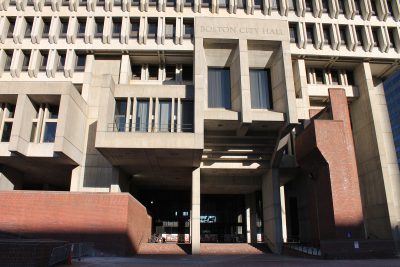
The Boston City Council gathered on Thursday to discuss a new proposal that would establish quotas for the minimum percentages of women and people of color working at the city’s construction sites.
This proposal, which was originally introduced by Boston Mayor Martin Walsh, would require construction companies to have at least 12 percent of people working on their sites to be women and at least 40 percent to be of a racial minority group.
The legislation would mandate that at least 51 percent of workers be Boston residents. If a company fails to meet this requirement, Councilor Tito Jackson said during the meeting that “we won’t let that company do business [in Boston].”
The council heard from panel of activists, community organizers and unionists, who testified in support of the provisions.
Lydia Lowe, the co-director of the Chinese Progressive Association, spoke during the meeting and described the proposal as a way to bridge the racial income gap.
“Boston is becoming a place for the global elite, as well as the lowest income workers, but [income inequality] is also particularly about the struggle of people of color in our communities,” she said. “People of color are more than half of the city’s population — it’s about time we raise [construction companies’] percentage goal.”
Lisa Owens, a member of the Right to the City said during the meeting that the new policy would offer a lifeline for Boston’s most disadvantaged communities.
“Do we really want to live in a city where more half of our residents have to make the dangerous choice between paying rent or paying for food or basic necessities? Therefore, we support the [proposal] because it supports the same Boston residents who are fighting to stay in [their] homes and neighborhoods,” she said.
Monica Lawton, a representative for the Associated Subcontractors of Massachusetts, Inc., expressed concern about this proposal, claiming it would impose unfair standards onto businesses.
“Clearly the demographics have changed, so the demographics of the industry should change … but we need to develop that pipeline of people with the skills and the experience to do the work,” she said. “You talk about increasing the pressure on developers and increasing the pressure on unions, but neither of those hire the workers — it’s the subcontractors who [do that].”
Attendees expressed support for the proposal discussed at the meeting.
Robin Barnes, 63, of Jamaica Plain said the provision requiring at least 51 percent of workers to be Boston residents is a good way for the city to scale back gentrification.
“I’ve lived in Jamaica Plain for over 35 years, and I’ve seen the gentrification … the changes and the people they’ve displaced and pushed out,” she said. “Part of that is because [locals] don’t have good jobs, and hopefully this will change that.”
Stevan Kirschbaum, 63, of Roslindale, the vice president of the Boston School Bus Drivers’ Union USW 8751, came out in solidarity with Boston’s construction workers.
“While the city is engaged in a huge amount of development, people … have been systematically excluded, and we’ve always stood against racism in construction trades,” he said. “We’re here today to … show we’re supportive in this effort. There is no place for racism and sexism in the building trades.”
Kirschbaum said the new provisions for race and gender quotas are a good way to achieve social justice.
“There has been a history of denying black and brown communities and women access to these jobs,” he said. “In order to take positive remedial action against this past history, it’s important to provide certain quotas, certain guidelines.”
President of the Boston School Bus Drivers’ Union, Andre Francois, 55, of Revere, said he agreed with these sentiments.
“People of color and women are not getting the jobs, and when they do get jobs, [women’s jobs are] not equal to men’s jobs and [minorities’ jobs aren’t equal] to whites’ jobs,” he said. “It’s critically important to change that.”

















































































































